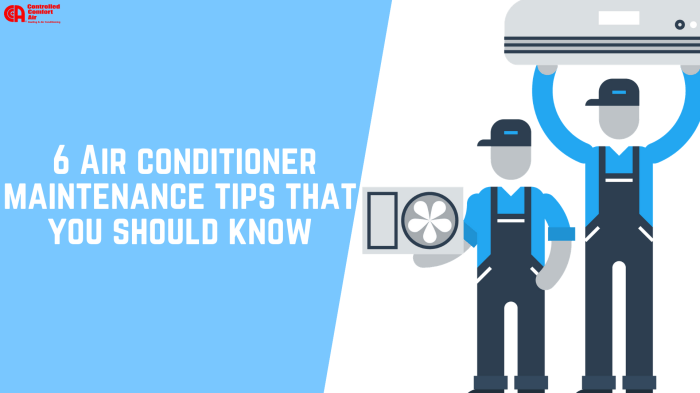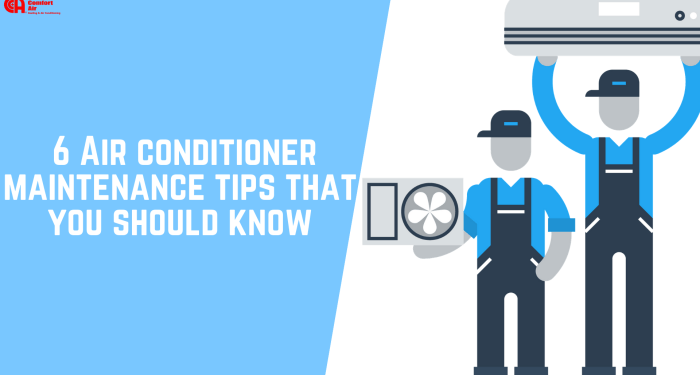As Airconditioner Maintenance Tips to Save on Bills takes center stage, this opening passage beckons readers into a world crafted with good knowledge, ensuring a reading experience that is both absorbing and distinctly original.
Regular maintenance of your air conditioner plays a vital role in not only keeping it running efficiently but also in cutting down on those hefty energy bills. Let's delve into some key tips that can help you save money while ensuring your AC unit functions optimally.
Importance of Regular Maintenance
Regular maintenance of your air conditioner is crucial for ensuring its efficiency and longevity. Neglecting maintenance can lead to a variety of issues that not only affect the performance of your AC but also result in higher energy bills.
Preventing Clogged Air Filters
One common maintenance task is replacing or cleaning air filters regularly. When air filters get clogged with dust and debris, airflow is restricted, causing your AC to work harder to cool your home. This increased strain on the system can lead to higher energy consumption and ultimately higher bills.
Checking and Cleaning Coils
Another important maintenance task is checking and cleaning the coils of your air conditioner. Over time, dirt and grime can build up on the coils, inhibiting heat transfer and reducing the efficiency of the system. By regularly cleaning the coils, you can ensure that your AC operates at its optimal level, saving you money on energy costs.
Extending Lifespan
Regular maintenance not only helps in improving the efficiency of your air conditioner but also extends its lifespan. By addressing issues early on and keeping your AC well-maintained, you can avoid costly repairs or premature replacement of the unit. Investing in routine maintenance can ultimately save you money in the long run and keep your air conditioner running smoothly for years to come.
Cleaning and Replacing Filters

Regularly cleaning or replacing the filters in your air conditioner is crucial for maintaining its efficiency and prolonging its lifespan. Dirty filters can significantly impact the performance of your air conditioner, leading to reduced airflow, increased energy consumption, and even potential damage to the system.
Importance of Cleaning or Replacing Filters
- Dirty filters restrict airflow, making it harder for the air conditioner to cool the room effectively.
- Clogged filters can cause the system to work harder, leading to higher energy consumption and increased utility bills.
- Over time, dirty filters can result in dust and debris buildup in the air conditioner, affecting its overall performance and potentially causing malfunctions.
How Often Filters Should be Cleaned or Replaced
- For standard filters, it is recommended to clean or replace them every 1-2 months, especially during peak usage seasons.
- If you have pets or live in a dusty environment, you may need to clean or replace the filters more frequently, possibly every 2-4 weeks.
- High-efficiency particulate air (HEPA) filters typically last longer, but it's still essential to check them regularly and follow the manufacturer's recommendations.
Clearing the Area Around the Unit
Keeping the area around your air conditioner clean and clear is crucial for maintaining its efficiency and prolonging its lifespan. Obstructions around the unit can hinder airflow, leading to reduced performance and higher energy consumption.
Significance of Proper Clearance
- Avoid placing objects like furniture, plants, or debris near the air conditioner as they can block the airflow, causing the unit to work harder and consume more energy.
- Proper clearance allows the air conditioner to intake and expel air efficiently, ensuring optimal cooling performance.
- Clearing the area around the unit also prevents potential damage from debris or pests that may be attracted to the warm environment.
Maintaining Proper Clearance
- Keep at least 2 feet of clearance around all sides of the air conditioner to ensure unrestricted airflow.
- Regularly remove any leaves, branches, or other debris that may accumulate near the unit.
- Trim any vegetation or bushes around the air conditioner to prevent them from obstructing the airflow.
Checking and Sealing Ducts
When it comes to the efficiency of your air conditioner, the ductwork plays a crucial role in ensuring that the cool air reaches every room effectively. Leaks in the ducts can lead to energy wastage and ultimately result in higher electricity bills.
How leaks in ducts can lead to energy wastage and higher bills
- Leaking ducts can cause the cool air to escape before reaching its intended destination, forcing your air conditioner to work harder and longer to maintain the desired temperature.
- This extra strain on the system not only reduces the overall efficiency of the air conditioner but also leads to increased energy consumption, reflected in higher utility bills.
- Moreover, leaking ducts can also pull in dust, dirt, and other contaminants, reducing the indoor air quality and potentially causing health issues.
Tips on how to check for duct leaks and seal them effectively
- Start by inspecting the visible ductwork for any obvious signs of damage, such as visible gaps, loose connections, or disconnected sections.
- Use a flashlight to check for leaks in areas that are not easily accessible, such as crawl spaces or attics.
- Run your hand along the ductwork while the AC is running to feel for any air leaks. You can also use smoke pencils or infrared thermography to detect leaks more accurately.
- Once you have identified the leaks, seal them using duct mastic or foil tape. Avoid using duct tape, as it tends to degrade over time and is not as effective in sealing leaks.
- Consider hiring a professional HVAC technician to conduct a thorough ductwork inspection and sealing to ensure optimal efficiency and energy savings.
Optimizing Thermostat Settings
Adjusting your thermostat settings can have a significant impact on your energy bills. By being mindful of the temperature settings at different times of the day and utilizing programmable thermostats effectively, you can maximize energy efficiency in your home.
Ideal Temperature Settings
- During the winter months, set your thermostat to around 68°F when you are at home and awake. Lowering the temperature when you are asleep or away can help save on heating costs.
- In the summer, aim for a temperature of 78°F when you are at home. Raising the temperature when you are away or asleep can reduce cooling expenses.
Using Programmable Thermostats
- Programmable thermostats allow you to set different temperatures for various times of the day, ensuring your HVAC system runs efficiently without wasting energy.
- Take advantage of the scheduling features to automatically adjust the temperature based on your daily routine, such as lowering the heat when you leave for work and raising it before you return.
- Consider setting your thermostat a few degrees cooler in the winter and warmer in the summer to save on energy costs without sacrificing comfort.
Professional Maintenance Services
When it comes to ensuring the optimal performance and longevity of your air conditioner, professional maintenance services play a crucial role. These services are designed to not only save you money in the long run but also to keep your unit running efficiently at all times.
Benefits of Hiring Professional Services
- Expertise: Professional technicians have the knowledge and experience to identify and address potential issues before they escalate.
- Efficiency: Regular maintenance by professionals can improve the overall efficiency of your unit, leading to lower energy bills.
- Longevity: Proper maintenance can extend the lifespan of your air conditioner, saving you the cost of premature replacements.
What Professional Maintenance Typically Involves
- Inspection: A thorough inspection of your air conditioner to check for any issues or signs of wear and tear.
- Cleaning: Cleaning of various components like coils, fins, and filters to ensure optimal airflow and efficiency.
- Repairs: Addressing any repairs or replacements needed to keep your unit running smoothly.
Tips on How to Choose a Reliable and Skilled Maintenance Service Provider
- Check Credentials: Make sure the service provider is licensed, insured, and has positive reviews from past customers.
- Experience: Look for a company with years of experience in the industry, as they are likely to provide quality service.
- Service Agreements: Inquire about service agreements and warranties offered by the provider to ensure peace of mind.
Wrap-Up
In conclusion, by following these air conditioner maintenance tips, you can effectively lower your energy bills, enhance the lifespan of your unit, and enjoy a cooler and more comfortable living space. Stay proactive in caring for your air conditioner to reap the benefits of reduced costs and increased efficiency.
Quick FAQs
How often should I clean or replace my air conditioner filters?
It's recommended to clean or replace your air conditioner filters every 1-3 months, depending on usage and the type of filter you have.
What are the ideal temperature settings for energy efficiency?
Setting your thermostat to 78°F when you're at home and higher when you're away can help save on energy costs while keeping you comfortable.
Why is it important to clear the area around the air conditioner unit?
Clearing the area around the unit ensures proper airflow, preventing obstructions that can lead to reduced efficiency and increased energy consumption.
How can I check for duct leaks in my air conditioning system?
You can check for duct leaks by running your hand along the ducts to feel for any air leaks or by using a smoke pencil to detect airflow irregularities.
What are the benefits of hiring professional maintenance services for my air conditioner?
Professional services can ensure thorough maintenance, early detection of potential issues, and overall improved performance of your air conditioner, ultimately saving you money in the long run.



